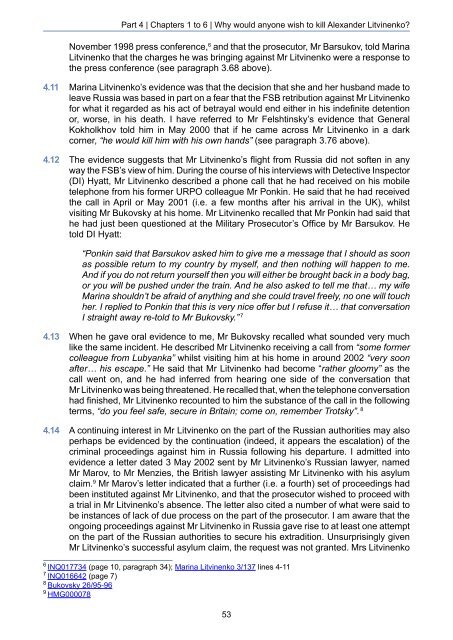The Litvinenko Inquiry
2429870
2429870
Create successful ePaper yourself
Turn your PDF publications into a flip-book with our unique Google optimized e-Paper software.
Part 4 | Chapters 1 to 6 | Why would anyone wish to kill Alexander <strong>Litvinenko</strong>?<br />
November 1998 press conference, 6 and that the prosecutor, Mr Barsukov, told Marina<br />
<strong>Litvinenko</strong> that the charges he was bringing against Mr <strong>Litvinenko</strong> were a response to<br />
the press conference (see paragraph 3.68 above).<br />
4.11 Marina <strong>Litvinenko</strong>’s evidence was that the decision that she and her husband made to<br />
leave Russia was based in part on a fear that the FSB retribution against Mr <strong>Litvinenko</strong><br />
for what it regarded as his act of betrayal would end either in his indefinite detention<br />
or, worse, in his death. I have referred to Mr Felshtinsky’s evidence that General<br />
Kokholkhov told him in May 2000 that if he came across Mr <strong>Litvinenko</strong> in a dark<br />
corner, “he would kill him with his own hands” (see paragraph 3.76 above).<br />
4.12 <strong>The</strong> evidence suggests that Mr <strong>Litvinenko</strong>’s flight from Russia did not soften in any<br />
way the FSB’s view of him. During the course of his interviews with Detective Inspector<br />
(DI) Hyatt, Mr <strong>Litvinenko</strong> described a phone call that he had received on his mobile<br />
telephone from his former URPO colleague Mr Ponkin. He said that he had received<br />
the call in April or May 2001 (i.e. a few months after his arrival in the UK), whilst<br />
visiting Mr Bukovsky at his home. Mr <strong>Litvinenko</strong> recalled that Mr Ponkin had said that<br />
he had just been questioned at the Military Prosecutor’s Office by Mr Barsukov. He<br />
told DI Hyatt:<br />
“Ponkin said that Barsukov asked him to give me a message that I should as soon<br />
as possible return to my country by myself, and then nothing will happen to me.<br />
And if you do not return yourself then you will either be brought back in a body bag,<br />
or you will be pushed under the train. And he also asked to tell me that… my wife<br />
Marina shouldn’t be afraid of anything and she could travel freely, no one will touch<br />
her. I replied to Ponkin that this is very nice offer but I refuse it… that conversation<br />
I straight away re-told to Mr Bukovsky.” 7<br />
4.13 When he gave oral evidence to me, Mr Bukovsky recalled what sounded very much<br />
like the same incident. He described Mr <strong>Litvinenko</strong> receiving a call from “some former<br />
colleague from Lubyanka” whilst visiting him at his home in around 2002 “very soon<br />
after… his escape.” He said that Mr <strong>Litvinenko</strong> had become “rather gloomy” as the<br />
call went on, and he had inferred from hearing one side of the conversation that<br />
Mr <strong>Litvinenko</strong> was being threatened. He recalled that, when the telephone conversation<br />
had finished, Mr <strong>Litvinenko</strong> recounted to him the substance of the call in the following<br />
terms, “do you feel safe, secure in Britain; come on, remember Trotsky”. 8<br />
4.14 A continuing interest in Mr <strong>Litvinenko</strong> on the part of the Russian authorities may also<br />
perhaps be evidenced by the continuation (indeed, it appears the escalation) of the<br />
criminal proceedings against him in Russia following his departure. I admitted into<br />
evidence a letter dated 3 May 2002 sent by Mr <strong>Litvinenko</strong>’s Russian lawyer, named<br />
Mr Marov, to Mr Menzies, the British lawyer assisting Mr <strong>Litvinenko</strong> with his asylum<br />
claim. 9 Mr Marov’s letter indicated that a further (i.e. a fourth) set of proceedings had<br />
been instituted against Mr <strong>Litvinenko</strong>, and that the prosecutor wished to proceed with<br />
a trial in Mr <strong>Litvinenko</strong>’s absence. <strong>The</strong> letter also cited a number of what were said to<br />
be instances of lack of due process on the part of the prosecutor. I am aware that the<br />
ongoing proceedings against Mr <strong>Litvinenko</strong> in Russia gave rise to at least one attempt<br />
on the part of the Russian authorities to secure his extradition. Unsurprisingly given<br />
Mr <strong>Litvinenko</strong>’s successful asylum claim, the request was not granted. Mrs <strong>Litvinenko</strong><br />
6<br />
INQ017734 (page 10, paragraph 34); Marina <strong>Litvinenko</strong> 3/137 lines 4-11<br />
7<br />
INQ016642 (page 7)<br />
8<br />
Bukovsky 26/95-96<br />
9<br />
HMG000078<br />
53


